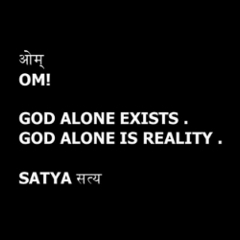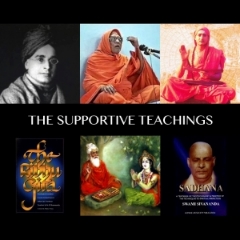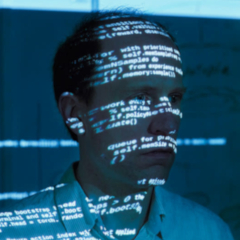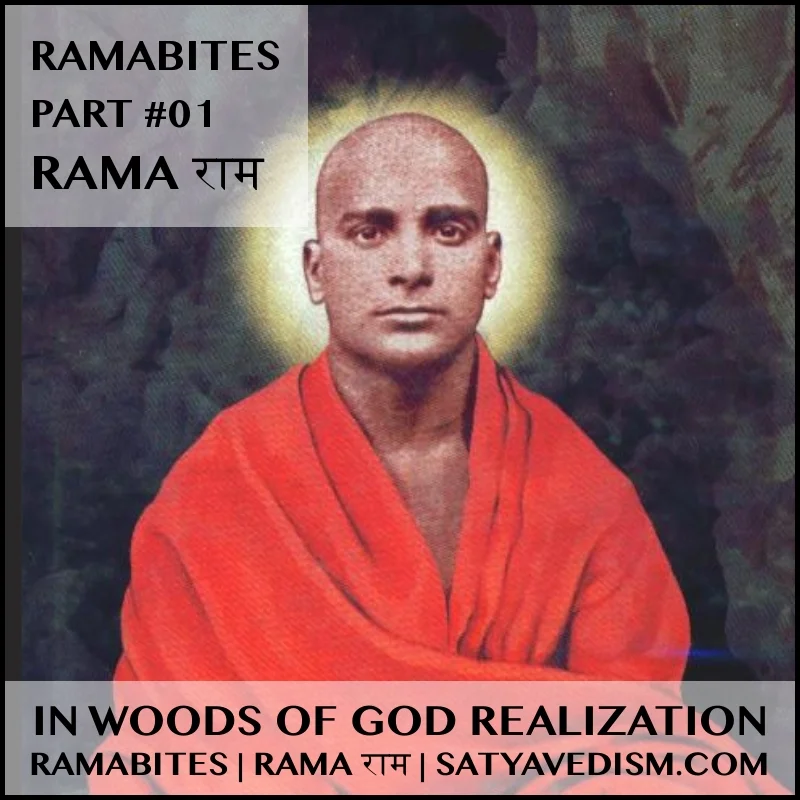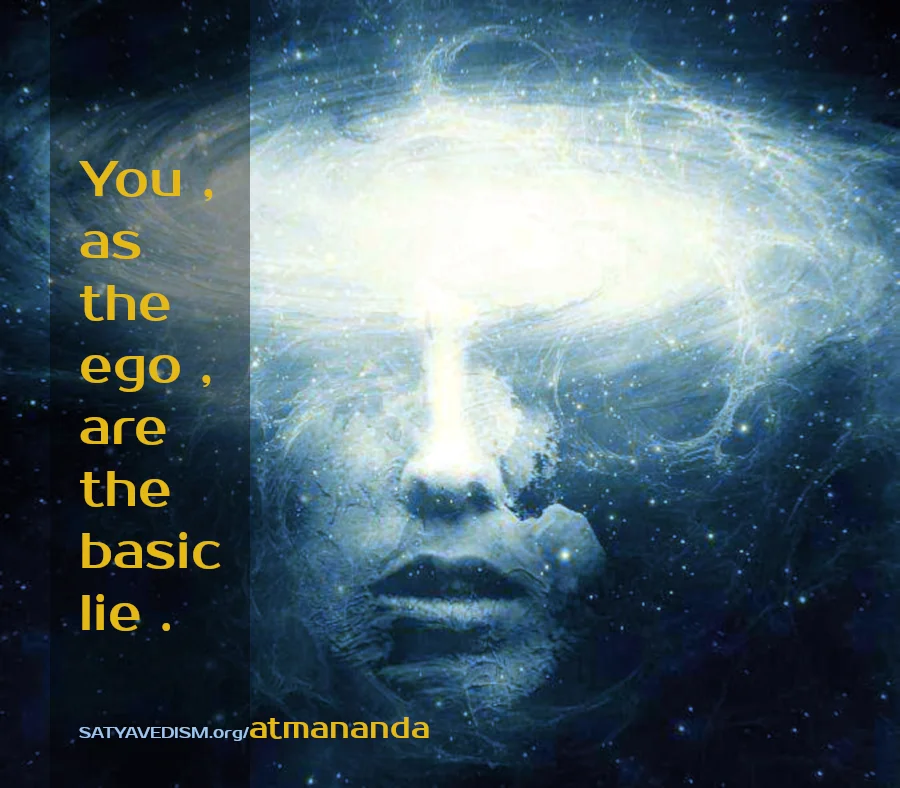GEMS ON THE WAY TO THE ABSOLUTE
| | homeGEMS ON THE WAY TO THE ABSOLUTE
108 Sentences Selected and Compiled from
The Realisation of The Absolute by Swami Krishnananda
1. Philosophy is the dear delight of the reason ; the great joy of the understanding .
2. True philosophy is the solace of the heart , the peace of the mind , the refuge of the human individual .
3. Philosophy examines the entire gamut of possible experiences and lifts human thought to the Divine Consciousness .
4. Only a citizen of the Universe can be an enjoyer of peace — the peace that passeth understanding .
5. The Upanishads have always been acknowledged and acclaimed as veritable mines of Transcendental Wisdom .
6. It is a mistake to be interested in the different forms of perception . Nothing is worth considering except the realisation of Brahman .
7. This intellect is a very inadequate means of ascertaining Truth . But however much imperfect , it is the only human faculty of knowledge nearest to Reality .
8. To express what is complete is not within the capacity of the knowing process . All knowing is a process , and all process is imperfection .
9. Intellect is never free from subject-object relationship — and every such relation falls short of Reality .
10. Reason should always be aided by tolerance , and should not forget its own limitations .
11. The only condition , however , is that the aspiring intellect should be pure and unattached .
12. Even death occurs through wrong belief , and even life is saved through mere belief .
13. Perfection on Truth cannot be two , and there cannot be two Absolutes .
14. Existence is really the existence of Consciousness .
15. Nothing that is related to another is real . Relation always means interdependence and not Self-Existence .
16. Even the emperorship of the entire Universe cannot give perpetual satisfaction as long as it falls short of the Infinite .
17. The Upanishads are the ripe fruits of fine flowers blossomed out in the light of the Wisdom-Sun .
18. The quickness of the process of Attainment depends upon the intensity of the power of Meditation — both in its negative and assertive aspects .
19. The Bliss of unlimited Consciousness is the Zenith of Existence , and every thing other than this is condemned as untrue .
20. The delight of the Self is the delight of Being . It is the Bliss of Consciousness-Absolute .
21. Change is the quality of untruth and the Upanishads assert that Reality is self-satisfied , self-existent , non-dual , tranquil and utterly Perfect .
22. The Truth " Knowing which every thing becomes known " is the subject of enquiry and the object of quest in the Upanishads .
23. Blessed is one , and one has truly lived a purposed life , who attains to the height of undying joy in this very life ; and one is a great loser and has lived one's life in vain , who has failed to realise the Truth here . ( Kena Up 2-5 )
24. All is well with one , whose heart is turned towards acting in accordance with the deathless law of Infinite Life . No disease , physical or mental , can ever assault one .
25. The welfare of society rests in its spirituality .
26. The ills caused by wrong methods of education , the social and political strife , the individual evils and the world-degeneration are all effected by the one terrible fact , that humanity turned against the law of the Spiritual Reality .
27. The Upanishads are our guidelights in the Supreme Pursuit . Let us understand and follow them with sincerity , faith , calmness , surety and persistence .
28. Change is the law of life ; nothing is without changing itself .
29. Tranquility can well be said to be non-existent in the history of the space-time world .
30. Cognition is impossible without a pre-existence link between the subject and the object .
31. All contacts presuppose an immovable ground which supports all movements .
32. That objects exist also cannot be proved unless there are minds to cognise and know them . Each is explained only by the other and not by itself .
33. The test of Reality is non-dependence , completeness and imperishability .
34. One Reality appears as the knower as well as the known .
35. The Substance by itself does not change ; only the mode of perception changes .
36. In order to have the experience of Reality we have to discard the forms as mere appearances .
37. To assert diversity is to deny Absoluteness .
38. To say that we are not yet the Reality , and we have yet to " become " It , may be true with partiality to empirical Consciousness , but it is not the Highest Truth .
39. Realisation is not an actual " becoming " , but an unfolding of Consciousness , an Experience of Truth — Truth that already is , Truth that is eternal .
40. The Self is not really bound by space and time .
41. The Absolute of the Upanishads is the only Reality and all forms must , therefore , be nonexistent from the point of view of Its exact nature .
42. A faithfulness to diversity must necessarily end in a failure in the practical walk of life .
43. Truth is the undivided Absolute . Truth cannot be twofold .
44. The Absolute and the relative are not two different entities standing like parent and child .
45. If Brahman has expressed Itself as the world , then the world cannot exist outside Brahman .
46. Even space is Brahman .
47. If we are not Brahman at present , we can never be That at any time in future . A Not-Brahman cannot be turned into Brahman .
48. Absolute-Existence does not admit of differentiation of any kind .
49. Nothing can be said about the Absolute , except that It " Is " .
50. Brahman which is the cause , and the world which is the effect are basically identical , and hence change and causation lose their meaning .
51. Absolutism satisfactorily solves all the problems of life .
52. Everyone is inside the prison of one's own experience and knows nothing outside one's consciousness .
53. A GOD , who changes Itself , is not a permanent Being .
54. The richness of the part is not equal to the magnificence of the Whole .
55. The world " All " does not refer to the reality of the plurality of things .
56. Duality cannot survive and individuality cannot exist in the Truth of Brahman .
57. The infinite Bhuma alone hails Supreme . It is established in Its own Greatness . It is not dependent on anything else , for anything else is not .
58. All that appears to exist need not really exist as such .
59. Reaching the Real is not an action .
60. We seem to be doing many things , though actually we do nothing .
61. A perishable means cannot lead to an eternal End .
62. The world exists , because the mind functions on a dualistic basis . There is sound , because there is the ear and there is colour , because there is the eye . The human individual exists as such , because it thinks .
63. No form is self-existent .
64. The dance of ideas is the world of experience .
65. Though no thing exists , it is not true , that nothing exists — for Consciousness exists .
66. There is no duality . All modification is illusory .
67. The form of the world of plurality is an illusion , though the ultimate Essence of the world is real .
68. Truth persists even in the extreme of untruth . Untruth is a lesser truth and evil is a lesser degree of goodness .
69. The individual is the footprint of the Absolute .
70. The individual is a copy or miniature of the Cosmic .
71. Truth is inclusive of everything in the world .
72. One begins from the physical body and ends in the imperishable Soul .
73. Life is a dramatic struggle for Self-Realisation , and Truth-Experience .
74. The state of perfection is neither an indivisibility nor a multiplicity , — but an indivisible Multiplicity .
75. The world is not an illusion , but a form of the Absolute .
76. Even materialism is a step in the path to Perfection .
77. Death is the beginning of a better life . Evil is the starting point of a state leading to good .
78. Every thing is only a part of the Infinite Completeness .
79. We cannot know any thing except in terms of what we are .
80. The knowledge of everything through the knowledge of One Thing implies that everything is made up of that One Thing .
81. Thought is objectified consciousness . The greater the objectification , the denser is the ignorance and the acuter are the pains suffered .
82. The aspiration of every living being is to find rest in the blissful possession of Eternal Life and nothing short of it .
83. The march of the soul is from the false to the true , from the apparent to the real , from the shadow to the light , from the perishable to the ever-enduring .
84. There is nothing greater than or equal to the knowledge of the Aatman : " Aatmalaabhaat Na Param Vidyate " .
85. When we turn our face away from this One Reality , we open the door to Self-imprisonment .
86. The love of life is based on the love of the Self .
87. The fervour of a Nachiketas or Dhruva , of a Prahlaada or Meera is expected in every spiritual aspirant .
88. Even Devarshi Narada's knowledge is regarded by Sanatkumara as " mere names , mere words " .
89. Even death is not a bar in the process of the Realisation of Truth . Death is a reshuffling of Consciousness to adjust and adopt itself to a different order of life .
90. To know IT is to be saved . Not to know IT is death .
91. The ordinary person of the world has mind and senses turned extrovert .
92. Some blessed one turns the gaze inward and beholds the glorious light of the Self .
93. The Self is imperishable .
94. Consciousness gets diffused through the distractive intellect and creates the perception of multiplicity .
95. Forms float in Truth , even as bubbles in the ocean . They cannot exist apart from the Ocean of Truth .
96. The deceived Soul fears death of its body , death of what it considers as dear . It loves objects , which do not promise real satisfaction .
97. The dream-objects have to vanish if waking experience is to be had .
98. Every true civilisation , if it is not meant to deceive itself , has to gird up its loins for Self-Realisation .
99. The value of a person is nothing if one does not aspire for the realisation of the Eternal Good , the Good not merely of this or that class of humans , but of the entire Universe .
100. Perfection is Absolute-Experience , " Brahma-Anubhava " , the Consciousness of Reality .
101. Omnipresence , Omniscience and Omnipotence are said to be the characteristics of GOD .
102. Brahman is That , which is permanent in things that change .
103. The whole Universe is a spiritual Unity and is One with the essential Brahman .
104. The knowledge of the Self is the knowledge of Brahman .
105. When Brahman is known , all is known .
106. There is no seer but That , no hearer but That , no thinker but That , no knower but That .
107. According to the Rig Veda , even " immortality and death are It's shadows " . What ever truly exists is the Real .
108. Brahman is Infinite , the Universe is Infinite ; from the Infinite proceeds the Infinite , and after deducting the Infinite from the Infinite , what remains is but the Infinite .
SOURCE | SATYAVEDISM.ORG











